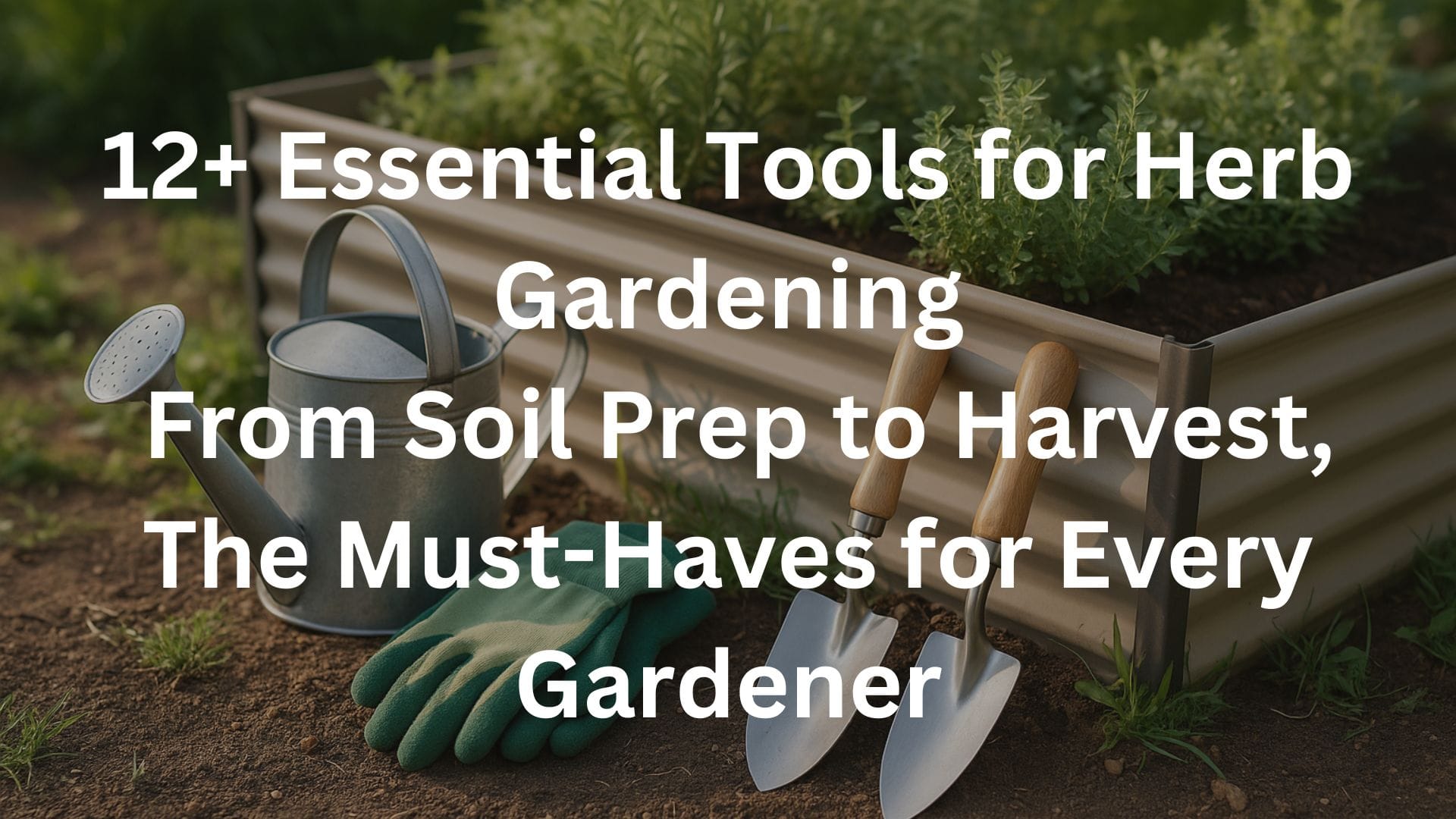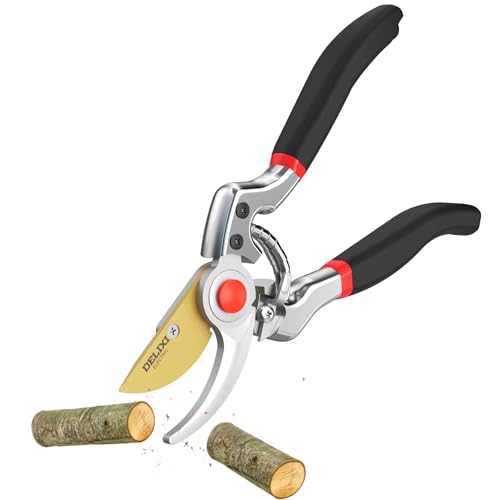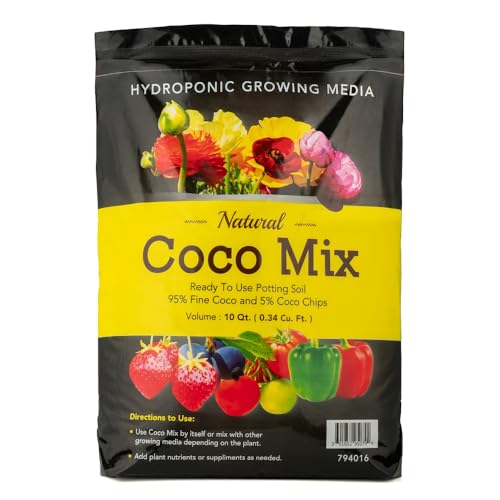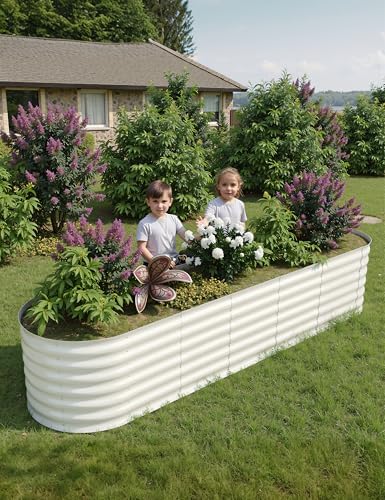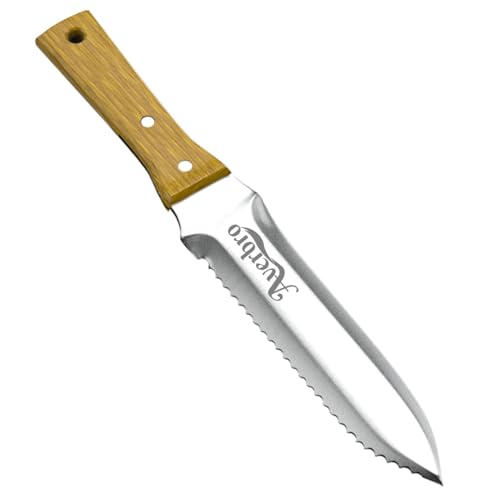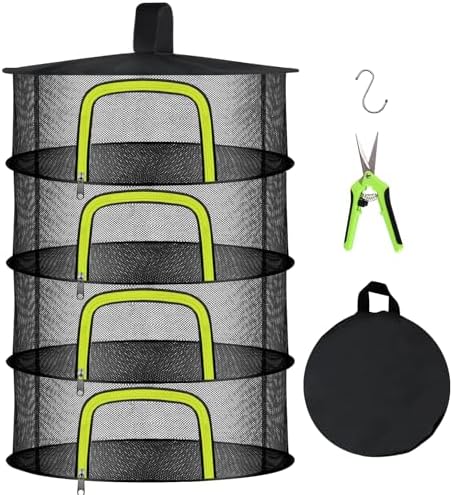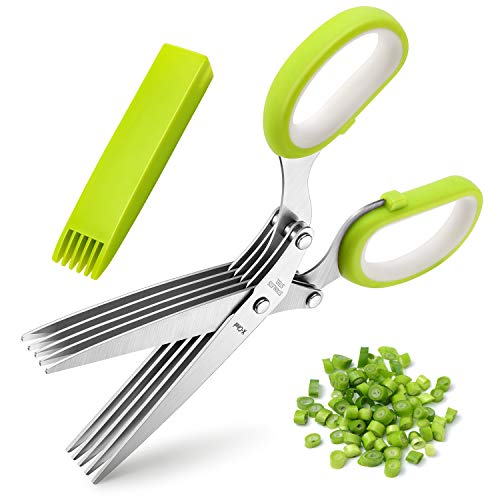The Herb Gardener’s Essential Toolkit
Essential herb gardening tools make it easier to plant, care for, and harvest herbs successfully. Whether you are starting fresh or upgrading your kit, having the right tools will save time, reduce strain, and keep plants healthy. In this guide, you will discover the essential herb gardening tools that make growing easier, faster, and more rewarding.
This page contains affiliate links. As an Amazon Associate, I earn from qualifying purchases. Read my full disclaimer.
Planting & Preparing the Garden with Essential Herb Gardening Tools
Build your herb garden from the ground up with essential herb gardening tools for soil preparation, seed starting, and strong, healthy roots.
Garden Tool Set
- Fully Accessorised 10-piece Set: 10PCS garden tools set-ncludes Weeder, Hand Rake, Transplanter ,Hand Cultivator ,Trowel…
- Stainless Steel Garden Tools Set: 10 piece outdoor hand tools are made of high hardness stainless steel, which is more c…
- Stainless Steel Garden Tools Set: 10 piece outdoor hand tools are made of high hardness stainless steel, which is more c…
Why This Tool is Essential: For beginners, or anyone looking for a comprehensive and organized start, a well-rounded tool set is invaluable. It provides all the basic implements you’ll need for various gardening tasks, ensuring you’re never caught unprepared. This particular set stands out for its thoughtful inclusion of a tote, making organization and transport a breeze.
What to Look For: When choosing a set, prioritize durability (rust-resistant materials like stainless steel), comfortable, non-slip grips, and a good variety of essential herb gardening tools (trowel, rake, transplanter, gloves, spray bottle). A sturdy tote is a huge bonus for keeping everything together.
Our Experience: We love how this set bundles everything a new herb gardener needs into one convenient package. The quality of the tools is surprisingly good for a starter set, and the tote is incredibly practical for carrying tools around the garden or keeping them tidy in storage. It’s the perfect gift for aspiring herb gardeners! This bundle covers the essential herb gardening tools most beginners need to get confident fast.
Pruning Shears (Secateurs)
- Professional SK5 Steel Blade for Effortless Cutting – Premium SK5 high-carbon steel delivers exceptional sharpness and d…
- Teflon Coated for Smooth & Rust-Free Cuts – Non-stick coating prevents sap buildup, resists rust and corrosion, and ensu…
- Extra-Wide 2.17″ Jaw Opening – Oversized opening handles thicker branches, stems, and shrubs with ease. Ideal hand prune…
Why This Tool is Essential: Pruning shears are arguably the most important tool for any herb gardener. Regular and precise pruning encourages bushier growth, prevents disease, and ensures a continuous supply of fresh herbs. They allow you to make clean cuts without tearing stems, which is vital for plant health.
What to Look For: Look for sharp, rust-resistant blades (bypass pruners are generally best for live stems), a comfortable ergonomic grip that fits your hand, and a safety lock mechanism. Compact sizes are often ideal for delicate herb stems.
Our Experience: We use our pruning shears almost daily! They’re perfect for harvesting individual sprigs of rosemary, snipping basil leaves, or deadheading spent lavender blooms. A good pair makes all the difference in maintaining healthy, productive herb plants. We prefer a smaller, sharper pair for the precision needed with herbs. Compact, durable, and clearly an essential herb gardening tool for daily use.
The All-in-One Herbalist’s Pruning Set (6-Piece)
Equip your medicinal garden with this versatile 6-piece heavy-duty pruning set, designed to take the guesswork out of plant care.
Featuring high-carbon steel blades for clean, healthy cuts, this set includes specialized bypass shears for thick branches, precision snips for delicate herb harvesting, and a folding saw for woody perennials. The ergonomic, sponge-wrapped handles are specifically designed to reduce hand fatigue during long garden sessions, while the included gloves and storage bag keep you organized and protected.
Garden Gloves: A Must-Have Essential Herb Gardening Tool
- DURABLE AND BREATHABLE MATERIAL: Gardening gloves are made of microfiber leather to ensure abrasion resistance. Reinforc…
- UNIQUE DESIGN:These practical gloves are carefully designed with a unique tulips garden design on the back of the hand t…
- TOUCH SCREEN DESIGN WOMEN GARDENING GLOVES:The garden work gloves women with special touch screen design, which more hum…
Why This Tool is Essential: Protecting your hands is paramount in the garden. Gloves shield you from dirt, thorns, rough soil, and potential irritants. They also provide a better grip on tools and help prevent blisters, making your gardening sessions more comfortable and enjoyable.
What to Look For: Seek out gloves that are durable yet flexible, offering good dexterity. Breathable materials are a plus for comfort, and a snug fit is important to prevent slippage. Consider waterproof options for wet tasks and reinforced fingertips for heavy use.
Our Experience: We’ve learned the hard way that a good pair of garden gloves is non-negotiable! From handling prickly stems to digging in rich soil, they keep our hands clean, safe, and comfortable. We especially love gloves with reinforced palms and a breathable upper to balance protection and comfort in the tropical heat.
🌿 Need Indoor Light for Your Herbs?
If you’re growing herbs in a shady spot or want to keep your tea garden thriving year-round, good lighting makes all the difference.
👉 Check out my top picks for the best grow lights for herbs, from compact setups to full-spectrum options for indoor gardening.
Watering & Weeding Essentials: Essential Herb Gardening Tools for a Thriving Garden
Watering Can
- VERSATILE WATERING CAN: Perfect for a wide range of indoor and outdoor plants, this modern stainless steel watering can …
- PRECISION LONG SPOUT & NO SPILL JUG: Designed for gentle, precise watering, our can’s long spout reaches deep into pots,…
- DURABLE & NON-PLASTIC CONSTRUCTION: Crafted from high-quality stainless steel, this watering can offers a robust alterna…
Why This Tool is Essential: Consistent and gentle watering is necessary for healthy herb growth. A watering can allows for precise application of water directly to the soil, helping avoid splashing delicate leaves and preventing fungal issues. It’s especially important for seedlings and potted herbs.
What to Look For: Choose a watering can with a comfortable handle and a long, slender spout for targeted watering. A rose (sprinkler head) with fine holes provides a gentle, rain-like shower, which is perfect for young plants and prevents soil erosion in small containers.
- 【Size and Capacity】The watering can and spray bottle set is ideal for indoor plant care. Each package includes a 21oz/60…
- 【Material】The watering can is made of high-quality stainless steel, ensuring quality with its leak-proof,rust-resistant,…
- 【Convenient Use】The elongated spout of the indoor watering can allows for precise pouring without spillage, reaching eve…
Indoor Option: For herbs grown on windowsills or kitchen counters, a smaller indoor watering can is one of the most practical essential herb gardening tools you can own. Its size makes it easier to maneuver around tight spaces, and it holds just enough water for a few pots without being heavy to carry.
Our Experience: There’s something meditative about watering herbs with a good can. It allows us to connect with each plant and deliver the right amount of moisture without overwatering. We like using a large watering can for outdoor beds and a smaller, decorative one for indoor herbs near the kitchen, both being essential herb gardening tools that keep plants healthy. For precision watering without splashing, a watering can belongs on every list of essential herb gardening tools.
Garden Fork
- High-Quality Garden Fork: The garden fork head is made of high-strength manganese steel, with good elasticity and strong…
- Special Process: The pitch fork head is made of one-piece roll forging process, which is strong and durable, and can wit…
- Efficient Design: The 4 tines design of the garden fork saves time and effort when digging, and the ergonomic D-shaped w…
Why This Tool is Essential: A garden fork is indispensable for breaking up compacted soil, aerating garden beds, and mixing in compost or amendments. It’s gentler than a spade and helps improve drainage and root penetration, which are vital for healthy herbs.
What to Look For: Look for a fork with strong, sharp tines that can penetrate dense soil. Stainless steel is durable and rust-resistant. A comfortable long handle provides better leverage and helps reduce strain on your back when working in raised beds or larger areas.
Our Experience: We reach for the garden fork often when preparing new beds or refreshing tired soil. It’s perfect for loosening soil around herbs without damaging their roots. When paired with compost or organic matter, it makes soil prep quick and satisfying.
Weeding Tool
- 3-Piece Weeding Tool Set – This versatile set includes three specialized Hand Weeder Tool: a V-Weed Forks, 4-Tine Weed H…
- Deep-Root V-Weed Removal Tool – The 13-inch Uprooting Weeding Tool features sturdy fork tines that dig deep, while its l…
- Multi-Functional 4-Tine Uprooting Tool Claw – This 13-inch Manual Weeders has four 8mm-thick steel claws that break up c…
Why This Tool is Essential: Weeds compete with your herbs for nutrients, water, and sunlight. A dedicated weeding tool makes it easier to remove unwanted plants from tight spots without disturbing your herbs. Consistent weeding keeps your garden tidy and helps your herbs thrive.
What to Look For: Choose a tool that’s compact, sturdy, and easy to maneuver around delicate herb roots. There are many types to consider, like hand weeders, dandelion forks, or precision hoes. Look for sharp, rust-resistant steel and an ergonomic grip that won’t strain your wrist during longer sessions.
Our Experience: Weeding becomes surprisingly satisfying with the right tool! For herbs, we prefer a slim, curved hand weeder that can slide under stubborn roots. It lets us remove weeds close to basil or thyme plants without damaging them, especially in raised beds or containers.
Soil pH Tester
- Professional Soil Test Kit: All soil test kits on the market can not accurately detect soil chemical elements, the soil …
- A Total of 40 Tests for 4 Parameters Consisting of 10 Tests each for pH, Nitrogen, Phosphorus & Potassium: NewTest soil …
- Detailed & Easy to Understand Step-by-Step Instructions for Use: NewTest soil testing kit for gardening come with a quic…
Why This Tool is Essential: Different herbs have different soil pH preferences. A soil pH tester lets you measure your soil’s acidity or alkalinity so you can create the right growing conditions. This can directly affect nutrient uptake and the overall health of your plants.
What to Look For: Choose a tester that’s simple, reliable, and easy to read. Probe-style testers give instant readings, while chemical test kits offer detailed results. Accuracy, durability, and ease of use should be top priorities.
Our Experience: We use a pH tester when troubleshooting plant issues or when planting more sensitive herbs. It helps us make informed decisions about soil amendments, ensuring that our herbs grow strong and healthy.
Potting Mixes & Raised Beds: Essential Herb Gardening Tools for Healthy Growth
- Coco Coir Mix: Our natural plant soil is hydrated and comes in a convenient coco coir bulk bag. Use the versatile coco m…
- Natural Coconut Coir: This blend of coco coir & chips provides the ideal pH balanced environment to grow healthy plants….
- Indoor Plant Soil: Coco for plants indoor has better water retention compared to other indoor plant soil, resulting in s…
Why This Supply is Essential: The right potting soil is the foundation of healthy roots. It provides balanced nutrients, good drainage, and proper aeration for container-grown herbs and raised beds. Poor-quality soil can lead to stunted growth and weak plants.
What to Look For: Look for an organic, nutrient-rich mix designed for containers or raised beds. A good blend should be light, well-draining, and enriched with compost or natural amendments. Avoid heavy garden soil for pots as it can compact and suffocate roots.
Our Experience: We’ve seen firsthand how much difference quality potting soil makes. Herbs planted in a light, airy mix grow stronger, produce more leaves, and resist disease better than those in poor soil.
If you are starting your seeds in trays or pots before transplanting, you’ll need a light, fluffy medium. Check out my Ultimate Guide to Potting Soil for the best seed-starting blends.
Worm Castings
- 🍅【Organic Fertilizer】Provide a natural, digestible, and safe plant formula, which is balanced into a healthy dosage and …
- 🍅【Safe to Use】There’s no need for pre-mixing or measuring because our plant food provides adequate nutrients without the…
- 🍅【Nontoxic & Odor-Free】Our worm castings are nontoxic and odor free! They are completely safe to use around children and…
Why This Supply is Essential: Worm castings are a natural, nutrient-rich soil amendment produced by earthworms. They improve soil structure, boost beneficial microbes, and provide a gentle, slow-release source of nutrients that herbs can easily absorb.
What to Look For: Choose dark, fine-textured castings with a fresh, earthy smell. Look for products that are 100% pure castings without fillers. Organic-certified options are ideal for edible and medicinal herbs.
Our Experience: We love adding worm castings when transplanting herbs or as a top-dress in pots. They give plants a noticeable boost in growth and leaf production without the risk of burning roots. They’re perfect for gardeners who want a chemical-free way to nourish herbs.
Mulch
- High-Quality Coco Coir Chips: Our coconut coir husk chips are a premium quality orchid bark potting mix. Ideal as a coco…
- Optimal Plant Growth: With an ideal pH for plants, these coco chips for plants are great for indoor potting mix. The hig…
- Easy to Use Coco Husk for Plants: With 10 lbs. of product that expands to a 15-gallon capacity, these coconut coir chips…
Why This Supply is Essential: Mulch helps retain soil moisture, suppress weeds, regulate temperature, and gradually add organic matter as it breaks down. It reduces watering needs and keeps soil in better condition for your herbs year-round.
What to Look For: For herb gardens, choose organic mulches like straw, shredded leaves, or untreated wood chips. Avoid dyed or chemically treated mulches. Apply an even layer around plants, leaving a small gap around the stems to prevent rot.
Our Experience: Mulch has cut our watering time significantly during hot spells. It also keeps beds looking neat and makes it harder for weeds to take hold. Straw is our favorite for herbs, lightweight, easy to spread, and quick to break down into the soil.
Galvanized Raised Garden Bed
This raised bed is one of our favorite essential herb gardening tools for creating organized, productive spaces.
Why This Tool is Essential: Raised beds make it easy to control soil quality, improve drainage, and reduce weeds. The added height is more comfortable for planting and maintenance, and the contained space keeps herbs organized and easy to care for. A sturdy raised bed is one of the most essential herb gardening tools when you want clean soil, tidy beds, and reliable growth.
What to Look For: Choose a raised bed made from durable, rust-resistant materials like galvanized steel or cedar. Look for a height of at least 18–24 inches to reduce bending and allow deep root growth. An open-bottom design ensures proper drainage and connection to the ground soil.
Our Experience: We love how raised beds give our herb garden a neat, structured look while making planting and harvesting more comfortable. They’re especially useful in areas with poor native soil, and they allow us to create the perfect growing mix for each plant.
Seed Starting Mix
- 【Optimal Germination Environment】Omitgoter Seedling Soil is specially formulated to provide the ideal conditions for see…
- 【Enhanced Drainage and Aeration】The carefully balanced mix ensures excellent drainage and aeration, preventing waterlogg…
- 【pH Balanced for Seedlings】Specially pH balanced to create an optimal growing environment, our soil supports vigorous gr…
Why This Supply is Essential: A quality seed starting mix gives delicate seedlings the perfect environment to sprout and grow strong. It’s lightweight, retains moisture without becoming soggy, and has a fine texture that allows roots to develop easily.
What to Look For: Look for a sterile, fine-textured mix that’s free of large chunks. Many blends are peat- or coco coir-based with added perlite or vermiculite for aeration. Avoid heavy garden soil, which can compact and hinder seedling growth.
Our Experience: We always start our herbs in a dedicated mix rather than regular potting soil. The results are more consistent germination, healthier seedlings, and a smoother transplanting process.
Rooting Hormone
- POWERFUL DUAL-ACTION FORMULA: Specially formulated with 0.025% Indole Butyric-3 Acid and proprietary vitamins to both ac…
- VERSATILE LIQUID SOLUTION: Unlike thick gels that can be messy and difficult to apply evenly, our convenient dropper for…
- REDUCES TRANSPLANT SHOCK: Supports your plants through every transition – from initial propagation to repotting. When tr…
Why This Supply is Essential: Rooting hormone encourages faster, more reliable root development when propagating herbs from cuttings. It boosts success rates for plants like rosemary, lavender, and mint, helping them establish quicker.
What to Look For: Choose a form, powder, gel, or liquid that’s easy to apply to soft herb cuttings. Look for products labeled for edible plants and follow directions carefully to avoid overapplication.
Our Experience: We’ve found that using rooting hormone turns a tricky cutting into a thriving new plant. It’s especially helpful for herbs that are slower to root naturally, saving time and increasing success.
Hori Hori Garden Knife: The Ultimate Multipurpose Tool
- 【Multi-functional Blade】Sharp edge and serrated edge for various gardening tasks.
- 【Built-in Ruler】6-inch/150mm ruler on the blade for precise soil measurement.
- 【Premium Stainless Steel】Rust-resistant, long-lasting sharpness for outdoor use.
Why This Tool is Essential: Known as the “Soil Knife,” the Hori Hori is the most versatile tool for a medicinal gardener. It features a sharp straight edge for weeding, a serrated edge for cutting through tough Moringa roots, and a depth gauge for precise planting of turmeric and ginger rhizomes. It replaces three tools in one.
What to Look For: Prioritize a rust-resistant stainless steel blade with a full tang (the metal should go all the way through the handle) for maximum strength. A comfortable wooden or non-slip handle is vital for the leverage needed to lift heavy tropical roots without snapping them.
Our Experience: In our Trinidad garden, we never harvest ginger or turmeric without it! Its ability to saw through woody stems and then pivot to “lever” a root out of heavy clay makes it a game-changer. It’s the one tool we always keep in our garden holster. Check out our video demonstration here to see it in action harvesting fresh ginger.
Specialty Essential Herb Gardening Tools for Medicinal Herbs
These tools help you harvest, dry, and store medicinal herbs so they retain their flavor, aroma, and potency for months. Perfect for herbal teas, tinctures, salves, and other remedies.
Herb Drying Rack (Traditional Method)
- Essential Herbal Drying Rack: The suspended mesh is made of lightweight nylon mesh, which can directly contact food. Mul…
- Size and Usage: There are 2, 4, 6 and 8 layers herbs drying racks for selection, with the 4 layer measuring 23.6 x 23.6 …
- U-Shaped Zipper Design: Compared to a straight zipper, the wider and higher opening design makes it easier to put and ta…
Why This Tool is Essential:
A drying rack provides proper airflow to preserve the color, aroma, and medicinal compounds in your herbs. It keeps them clean, off surfaces, and away from direct sunlight, which can degrade their potency.
What to Look For:
Choose a rack with breathable mesh shelves, stackable layers, and a zippered enclosure to protect herbs from dust and insects. A collapsible design saves storage space.
Our Experience:
We hang our drying rack in a shaded, well-ventilated area. It’s ideal for those who prefer a low-tech, no-electricity method and works well for bulk harvests in dry climates. If you plan to preserve medicinal leaves and flowers, a drying rack is truly among the essential herb gardening tools
Electric Dehydrator (Quick & Reliable)
- 𝐂𝐨𝐦𝐩𝐚𝐜𝐭 & 𝐄𝐟𝐟𝐢𝐜𝐢𝐞𝐧𝐭 𝐅𝐨𝐨𝐝 𝐃𝐫𝐲𝐞𝐫 𝐟𝐨𝐫 𝐇𝐨𝐦𝐞 𝐊𝐢𝐭𝐜𝐡𝐞𝐧𝐬: Small food dehydrator designed to fit seamlessly into your kitchen, bu…
- 𝟓 𝐓𝐫𝐚𝐧𝐬𝐩𝐚𝐫𝐞𝐧𝐭 𝐁𝐏𝐀-𝐅𝐫𝐞𝐞 𝐓𝐫𝐚𝐲𝐬 𝐟𝐨𝐫 𝐕𝐞𝐫𝐬𝐚𝐭𝐢𝐥𝐞 𝐃𝐫𝐲𝐢𝐧𝐠: This dehydrator for home use includes 5 stackable, food-grade, see-th…
- 𝐂𝐮𝐬𝐭𝐨𝐦𝐢𝐳𝐚𝐛𝐥𝐞 𝐃𝐫𝐲𝐢𝐧𝐠 𝐰𝐢𝐭𝐡 𝐓𝐢𝐦𝐞𝐫 & 𝐓𝐞𝐦𝐩𝐞𝐫𝐚𝐭𝐮𝐫𝐞 𝐂𝐨𝐧𝐭𝐫𝐨𝐥: Set the timer from 10 minutes to 48 hours and adjust the temperatu…
Why This Tool is Essential:
An electric dehydrator dries herbs quickly and evenly, even in humid weather, locking in flavor and medicinal properties while reducing the risk of mold.
What to Look For:
Look for adjustable temperature settings, multiple stackable trays, and a quiet motor. A temperature range as low as 95°F (35°C) is best for delicate herbs.
Our Experience:
We rely on a dehydrator during rainy or humid seasons when air drying is slow or risky. It’s perfect for preserving herbs at their peak, and it works just as well for drying fruits, vegetables, and even herbal teas. In humid weather, a dehydrator becomes one of the essential herb gardening tools for safe, consistent drying.
Glass Storage Jars
- Tebery home mason jars are made from high quality glass, BPA-free and Lead-free, Set of 6.
- The 24oz canning jar features a classic design that offers ideal versatility for canning and crafting projects, wide mou…
- 24oz mason jars comes with a time tested airtight ceiling compound to held ensure a quality seal with each lid making th…
Why This Tool is Essential:
Glass jars are ideal for storing dried herbs. They are non-reactive, airtight, and protect against moisture, keeping herbs fresh for longer.
What to Look For:
Opt for jars with tight-sealing lids and dark or amber glass if possible, to reduce light exposure. Clear jars are fine if stored in a dark cupboard.
Our Experience:
We label each jar with the herb name and harvest date. Good storage habits make it easy to find what we need for teas or tinctures, and the jars look beautiful lined up on a kitchen shelf.
Mortar and Pestle: A Classic Essential Herb Gardening Tool
- A kitchen must-have: Mortar and pestle set (mortero de cocina – morter and pessel) has been used for THOUSANDS of years …
- Versatile tool: Take advantage of your brand new stone motar and pedestal set’s various applications in the kitchen and …
- Effortless use: This ChefSofi stone mocajetes motor & pedestal set was designed with your convenience in mind. Made from…
Why This Tool is Essential:
A mortar and pestle lets you grind dried herbs into powders for teas, capsules, or salves. It’s also useful for crushing fresh herbs for pastes and poultices.
What to Look For:
Choose a heavy, durable material like granite or ceramic for better grinding. The pestle should be comfortable to hold and the bowl deep enough to prevent spills.
Our Experience:
We love the control a mortar and pestle gives compared to an electric grinder, you can stop when the texture is exactly right.
Herb Scissors
- TIME SAVING: X-Chef 5-blade herb shear set is equivalent to 10 knife chops, which can snip fresh herbs, basils, or chive…
- QUALITY DESIGN: Heavy-duty steel rivet holds the 5 sharp blades together securely for consistent performance. Ergonomic …
- EASY TO CLEAN: Made of quality stainless steel, the herb scissors is dishwasher safe. Cleaning comb helps remove lingeri…
Why This Tool is Essential:
Herb scissors with multiple blades make it quick and easy to chop fresh herbs evenly without bruising the leaves.
What to Look For:
Look for stainless steel blades, comfortable grips, and a cleaning comb.
Our Experience:
They’re especially handy when preparing herbs for drying, as even cuts make for more consistent drying times.
Capsule Filling Machine
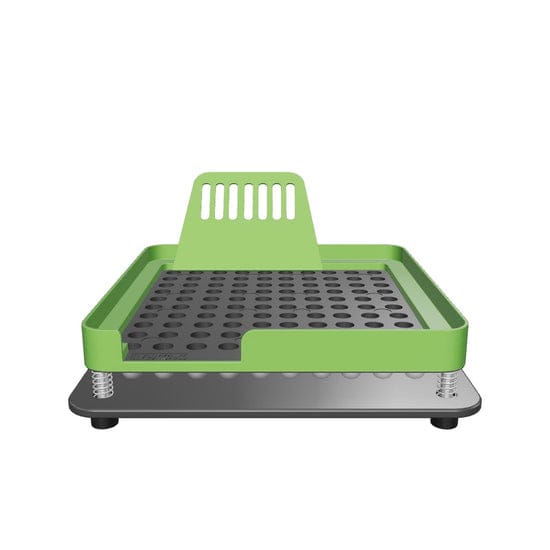
Fill 100 capsules in under 10 minutes with zero fillers or additives. Perfect for herbs, vitamins, and custom blends at home.
✅ Shop Now — Save 20%Why This Tool is Essential:
If you create your own herbal supplements, a capsule filling machine speeds up the process and ensures consistent dosing. Perfect for encapsulating powdered herbs like moringa, turmeric, or ashwagandha.
What to Look For:
Choose a size that matches your capsule preference (size 0, 00, etc.) and look for easy-to-clean parts. Some machines also come with tampers to pack herbs more tightly.
Our Experience:
We use a capsule machine for herbs we grow and powder ourselves. It’s satisfying to know exactly what’s inside each capsule — pure, home-grown goodness.
Tea Infuser & Strainer
- ✅ EXTRA FINE HONEYCOMB HEX MESH FOR PURE BREWS – Experience a perfectly smooth and flavorful cup with our advanced honey…
- ✅ PREMIUM FOOD-GRADE STAINLESS STEEL – Made from 304 stainless steel, these tea steepers are rust-proof, odor-resistant,…
- ✅ PREMIUM FOOD-GRADE STAINLESS STEEL – Made from 304 stainless steel, these tea steepers are rust-proof, odor-resistant,…
Why This Tool is Essential:
A good tea infuser or strainer makes it easy to brew loose-leaf herbal teas without mess. It keeps leaves contained while allowing water to circulate for full flavor extraction.
What to Look For:
Fine mesh prevents small particles from escaping. Stainless steel is durable, while silicone handles make removal safer when hot.
Our Experience:
We keep multiple infusers so we can brew different herbs without mixing flavors. A quality strainer also doubles as a filter for herbal tinctures and infused oils. This belongs in any kit of essential herb gardening tools.
With the right mix of essential herb gardening tools, you will save time, protect your plants, and enjoy fuller harvests. Start with the basics, then add the specialty items that match how you grow and use your herbs. These essential herb gardening tools will grow with you as your skills expand.
Learn how to start calendula from seed using these essential herb gardening tools
